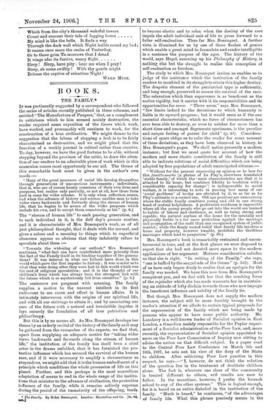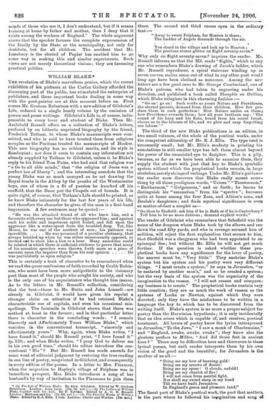BOOKS.
THE FAMILY.* IT was pertinently suggested by a correspondent who followed the sefies of articles recently published in these columns, and entitled "The Manufacture of Paupers," that, as a complement
to criticisms which to him seemed mainly destructive, the reader required some exposition of the forces which work, have worked, and presumably will continue to work, for the construction of a true civilisation. We might demur to the suggestion that the labour of stopping a leak is to be fairly characterised as destructive, and we might plead that the function of a weekly journal is critical rather than creative. To-day, however, we have the good fortune to be able, without stepping beyond the province of the critic, to draw the atten- tion of our readers to an admirable piece of work which in this connexion comes most opportunely to our aid. The theme of this remarkable book must be given in the author's own words :—
" Many of the great processes of social life develop themselves through generations of unconscious instruments ; individuals, that is, who are of course keenly conscious of their own lives and purposes, but realise only partially, or not at all, how these form part in some far wider scheme. It is only when reflection comes, and when the advance of history and science enables man to take wider views backwards and forwards along the stream of human life, that he begins to be aware of the wider purposes which include his own, and to accept them consciously as his." (p. 6.)
The "stream of human life" to each passing generation, and to each individual in it, is the dull day's prosaic routine, and it is characteristic of Mrs. Bosanquet's work, as of all just philosophical thought, that it deals with the normal, and gives a colour and a meaning to things which to superfic:al observers appear so obvious that they indolently refuse to speculate about them :—
"Towards the widening of our outlook," Mrs. Bosanquet continues, "what fact can have contributed more potently than the fact of the Family itself in its binding together of the genera- tions P It was interest in what our fathers have done in this -world which gave the first impulse to history ; it was wonder as to what they were doing after they were lost to this world which was the root of religious speculation; and it is the thought of our children's lives which has always been the strongest link with the future which is so mysteriously hid from ourselves." (p. 6.)
The sentences are pregnant with meaning. The family supplies a motive to the nascent intellect in its first
endeavour to see cause and effect in human affairs. It is intimately interwoven with the origins of our spiritual life,
and with all our strivings to attain it ; and by associating our care of the future with a natural and irresistible impulse it lays securely the foundation of all true patriotism and philanthropy.
But this is by no means all. As Mrs. Bosanquet develops her theme by an orderly recital of the history of the family as it may be gathered from the researches of the experts, we find that, apart from supplying an adequate motive for "taking wider views backwards and forwards along the stream of human life," the institution of the family has itself been a chief actor in the drama unfolded, that it has furnished the pro- tective influence which has secured the survival of the human race, and if it were necessary to amplify a circumstance so stupendous, we might add that it is the human embodiment of a principle which conditions the whole procession of life on this planet. Further, and this perhaps is the most marvellous adaptation of means to end in the whole range of the institu- tions that minister to the advance of civilisation, the protective influence of the family, while it remains actively supreme during the period of the immaturity of the offspring, tends
• The FamUy. By Helen Bosangnet, London: Macmillan and Co. [8a. wt.] to become elastic and to relax when the destiny of the race impels the adult individual unit of life to press forward to a fuller self-realisation. Thus far Mrs. Bosanquet. A further vista is illumined for us by one of those flashes of genius which enable a great mind to formulate and render intelligible in a sentence the purpose of the ages. The history of the
world, says Hegel, summing up his Philosophy of History, is nothing else but the struggle to realise this conception of self-realisation or freedom.
The study to which Mrs. Bosanquet invites us enables us to judge of the assistance which the institution of the family renders to mankind in its struggle to attain this higher destiny. The despotic element of the patriarchal type is sufficiently, and long enough, preserved to secure the survival of the race.
The relaxation which then supervenes is as beneficent as the earlier rigidity, but it carries with it its responsibilities and its opportunities for error. "There seem," says Mrs. Bosanquet, "few limits indeed to the deviations to which humanity is liable in its upward progress ; but it would seem as if the one essential characteristic, which no force of circumstances has ever been able to destroy, or even to subdue for more than a short time and amongst degenerate specimens, is the peculiar and unique feeling of parent for child" (p. 40). Considera- tions of space oblige us to refer the reader for some account of these deviations, as they have been observed in history, to Mrs. Bosanquet's pages. We shall notice presently a modern instance ; but first we must quote her account of how the modern and more elastic constitution of the family is dill able to indicate solutions of social diffieulties which are being adopted by free populations of adult emancipated citizens:—
" Without for the present expressing an opinion as to how far this famille-souche [a phrase of Le Play's, elsewhere translated 'stable family,' of which the 'main characteristics are that it is attached to its home, but combines fidelity to tradition with a considerable capacity for change'] is indispensable to social welfare, it is interesting to note in passing how many of our 'social problems' of to-day are obviated by it, in so far as Lo Play's estimate is a correct one. Old age pensions are unnecessary where the stable family combines young and old in one strong bond of mutual helpfulness. A proletariat residuum is impossible where all the young people who go out into the world are trained to habits of labour and obedience, as well as being strong and capable; the natural asylum of the home for the mentally and physically feeble is a far surer protection against the marriage and propagation of the unfit than any recognised system of public control ; while the firmly rooted belief that family life involves a home and property, however humble, prohibits the thriftless marriages which lead to pauperism." (p. 99.)
Mrs. Bosanquet's book is remarkably restrained and uncon- troversial in tone, and at the first glance we were disposed to regret that she had not devoted more space to the modern applications of her argument. Maturer consideration satisfies us that she is right. "In writing of the Family," she says,
"one is baffled by the magnitude of the theme" (p. 342). Most of us have only begun dimly to realise that an apologia for the family was needed. We have this now from Mrs. Bosanquet's
competent pen, and we feel with her that the crushing force of the rejoinder which she has made warrants her in maintain- ing an attitude of lofty disdain towards those who now impugn the beneficent influence and validity of the family tie.
But though Mrs. Bosanquet does not supply the modern instance, the subject will be more forcibly brought to the reader's attention if we allude to certain typical proposals for the supersession of the family which are being made by persons who appear to have some public authority. Mr. Lansbury is a well-known leader of Socialist opinion in East
London, a Guardian mainly responsible for the Poplar experi- ment of a Socialist administration of the Poor Law, and, more recently, the representative of Socialist opinion appointed to serve on the Poor Law Commission of Inquiry now sitting to
advise the nation on that difficult subject. In a paper read to the Central Poor Law Conference on March 9th and
10th, 1897, he sets oat his view of the duty of the State
to children. After criticising Poor Law practice in this respect, he says :—" I, however, do not think the solution of the question lies in the treatment of destitute children alone. The fact is, wherever one class of the community is treated different to others, evil results are sure to follow. In the meantime, however, I prefer the barrack school to any of the other systems." This is logical enough,
for it is based on an entire disbelief in the institution of the family. "Much is heard," he continues, "of the advantages of family life. What this phrase precisely means in the minds of those who use it, I don't understand, but if it means training at home by father and mother, then I deny that it exists among the workers of England." The whole argument shows that the speaker favours the complete supersession of the family by the State or the municipality, not only for destitute, but for all children. The accident that Mr. Lansbury is the elected of Poplar has enabled him to go some way in making this and similar experiments. Such views are not merely theoretical visions ; they are becoming practical politics.















































 Previous page
Previous page